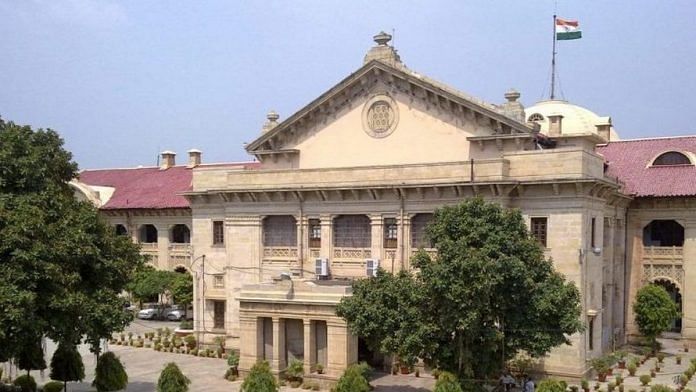New Delhi: On 13 April, the Supreme Court had ruled that high courts should refrain from passing interim orders that prevent police from making arrests or taking coercive action in a pending investigation. However, in the four months since, the Allahabad and the Uttarakhand high courts have issued directions contrary to the SC order in over 300 cases.
In such an interim order, a high court refuses to quash a criminal case as petitioned by the accused but instead of sending the accused back to the trial court to apply for anticipatory bail, the high court itself passes an order barring “coercive action”.
This direction is primarily meant to protect the accused from arrest till he or she approaches the appropriate court for bail.
On 23 August, an SC bench of Justices D.Y. Chandrachud and M.R. Shah expressed their displeasure at the two high courts for “passing orders one after the other without application of their mind”.
Citing the April judgment, the bench noted that the two HCs have been routinely issuing directions despite its order asking them to use the inherent power sparingly.
The comments were made while the court was hearing an appeal against an order by the Uttarakhand HC. In its order, the HC had given time to the accused to surrender and also directed the trial court to decide on his bail plea on the day he moves it.
Also read: Few special courts, bunked hearings — why thousands of cases against MPs, MLAs remain pending
What did SC order say?
In its 13 April judgment, a three-judge bench, led by Justice Chandrachud and comprising Justices Shah and Sanjeev Khanna, had specifically stated that when an investigation is in progress and the entire set of facts is not before the HC concerned, the latter should restrain itself from passing an interim order barring arrest or directing the police not to take “coercive steps”.
An accused, the court said, should simply be asked to apply for anticipatory bail. According to the bench, it would not be “justified” on the part of the HC to pass the directions either till the investigation is complete or till the final charge sheet is filed.
The SC bench further noted that in the event the HC is prima facie of the opinion that an exceptional case is made out for grant of interim stay of further investigation, it must demonstrate application of mind and furnish reasons for the same.
Whenever such an an interim order is passed by an HC within the aforesaid parameters, the court must clarify what it means by “no coercive steps to be adopted” since the term can be too vague and can be misunderstood or misapplied, the judgment added.
HC orders do not explain the term ‘no coercive steps’
A perusal of the orders passed by the two HCs, between 13 April and 23 August, shows that while the Allahabad High Court issued such directions in more than 190 cases, the Uttarakhand HC did so in over 125 cases.
All these orders arose on two types of quashing petitions — filed under Section 482 of the Criminal Procedure Code (CrPc) and Article 226 of the Constitution that empowers the HCs to issue directions, orders or writs in the nature of certiorari (when an HC reviews a case tried in lower court), habeas corpus (a writ filed to secure a person’s release from unlawful custody) or mandamus (a direction issued to an inferior court or ordering a person to perform a public or statutory duty), among others.
In all cases where such an order was passed by the HCs, the police were either yet to conclude their investigation and/or file charge sheets. Hence, the HCs directed that “no coercive steps” will be taken subject to the petitioner’s cooperation in the investigation.
However, the period of “no coercion” in most cases was blanket as the orders did not specify till when the police cannot initiate action to arrest. In very few matters, around one-fourth of the total orders, the court had indicated the protection from arrest was only till the next date of hearing.
The high courts issued “no coercion” orders even in cases where the FIR was filed under serious crimes such as attempt to murder, grievous hurt, cheating and Protection of Children from Sexual Offences (POCSO) Act.
Furthermore, none of the orders by either of the courts explained what was meant by the term “no coercive steps or measures”, as directed by the SC.
While the two high courts extended interim protection from arrest to the accused in all the matters, they declined to quash the pending criminal case against the petitioners.
Also read: ‘Unholy nexus’ — What SC said as it ordered demolition of Supertech’s twin towers in Noida
Courts must refrain from using the term ‘coercive step’
According to former Allahabad High Court Chief Justice Govind Mathur, every Supreme Court order is binding on all high courts under Article 141 of the Constitution.
“I am not aware of the nature of orders passed by the two HCs, but I strongly believe in criminal cases courts must stop using the term coercive step because it is vague and subject to misuse,” Justice Mathur told ThePrint.
According to him, the term was alien to criminal jurisprudence and till a few years back it was used in tax matters only.
Justice Mathur also deplored the practise of courts not giving “reasoned orders”.
“A judicial order is required to be a reasoned one. There can be exceptions, but only in cases where the court feels that disclosure of reasons in an order can affect police probe adversely,” he said.
(Edited by Rachel John)
Also read: In riots case, trial court says Delhi Police probe not good enough, slams ‘half-baked’ efforts



